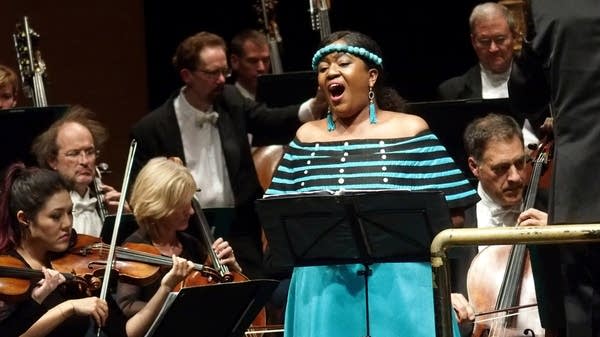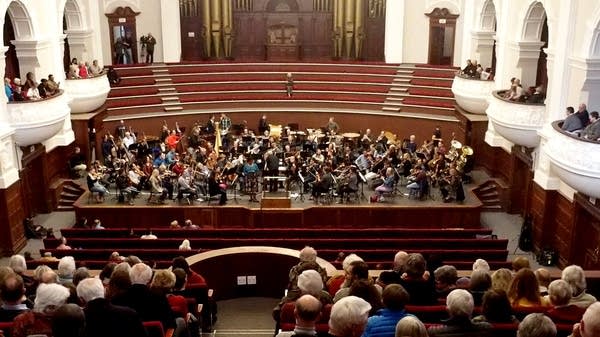Back from its South Africa tour, Minn. Orchestra reflects on connections made

Go Deeper.
Create an account or log in to save stories.
Like this?
Thanks for liking this story! We have added it to a list of your favorite stories.
A week ago today, the Minnesota Orchestra was in South Africa, preparing to play the most anticipated concert of its five-city tour of the country in Soweto, a township outside Johannesburg.
That night, a crowd packed the historic Regina Mundi church in Soweto as the Orchestra and the Minnesota Chorale filled the hall with music. It was part of a yearlong celebration of the centennial of Nelson Mandela's birth. Now, as the Minnesotans return home, musicians, staff, and audience are considering the visit's impact.
Orchestra president Kevin Smith said he has no doubt about the tour's importance.
"It's really been one of the great experiences in our professional lives," he said.
Turn Up Your Support
MPR News helps you turn down the noise and build shared understanding. Turn up your support for this public resource and keep trusted journalism accessible to all.

The numbers begin to paint the picture: Over 5,000 people attended concerts in Cape Town, Durban, Pretoria, Soweto and Johannesburg. Hundreds of students, ranging from elementary school to college age, joined performances, rehearsals and master classes with Minnesota Orchestra musicians.
For many audience members, it was the first time with a live orchestra. For some it was the first time even hearing classical music. The reception ranged from amazement to rapturous applause.
But an audience, and, for that matter, an orchestra — no matter how large — is made of individuals. And much of the impact of this tour came down to one-to-one interactions. During the orchestra's opening concert in Cape Town, tuba player Steven Campbell saw a youngster sitting in the front row after the first piece.
"[He was] looking around as he was clapping," Campbell said. "He was like: 'OK, how long do I have to do this?' And I made eye contact with him and I looked at him and I said, 'Thank you!' And he kind of lit up, and he got more engaged in the concert and that was amazing to see that."

The orchestra calls its kind of touring the "Minnesota Model": Concerts blended with outreach.
"In our community, in Cape Town, we had kids asking me to buy them some violins," said Brendon Adams, a co-founder of the 29:11 gospel group in South Africa. The outreach, he said, worked wonders: "That is progression right there!"
Adams grew up in the town of Elsies River, just outside Cape Town. He and his group visited the Twin Cities to help prepare the Orchestra and the Minnesota Chorale for their visit to South Africa. During the tour, back home, he arranged for musicians to visit students at the Eurocon Primary School in Elsies River. Many of the students had only seen violins and other classical instruments on TV before the visit.
"This is amazing, a world-renowned orchestra, to me the best in the world, coming to our communities," he said.

Orchestra members also met with young musicians in Cape Town and Pretoria. They spent two days rehearsing with South African National Youth Orchestra. The young players said they were inspired.
"Play your softs and louds really soft and really loud," said one young musician named Ben. "I've never seen an orchestra play as loud and soft as these people can."
Gerben Grooten, a Dutch conductor who teaches at the University of Pretoria, said the impact of the South African musicians playing side by side with the Minnesotans — and recognizing similar talents within themselves — was huge.
"It's that bringing value in their bodies and in their minds," he said. "And that is part of the transformation that we need in this nation. There needs to be a healthy sense of: 'I am valuable and I have something valuable to contribute to this world.' Not just for Africa, but: 'I can go overseas and contribute something unique.'"
He said South Africa has a lot to offer the world, if it would only build up its self-confidence. And the Minnesotans, too, he said, gained a lot from experiencing an African perspective.

"That cross-pollination of cultures, without labeling it as better or worse, it's not about that," he said. "It's about what happens when people sing or make music together from different hemispheres."
Classical music is not widely played in South Africa. Under apartheid — the segregation mandated by the minority-white Afrikaner government for half of the 20th century — it was held up as something exclusively for the white elite. That sentiment remained when apartheid fell.
That's why the Minnesota Orchestra wanted to introduce its music to new audiences during the tour. It took a lot of effort, including subsidizing tickets and offering money for gas and taxi rides to encourage people to attend.
Classical Movements, the tour's organizers — which also organized the orchestra's trip to Cuba three years ago — also worked with the orchestra to select pieces that the audience might recognize, or contain a choral element they would appreciate.

The organizers also commissioned a work called "Harmonia Ubuntu." Composer Bongani Ndodana-Breen set the words of Nelson Mandela to music, combining classical traditions with African rhythms.
The efforts worked, but no more so than at the tour's capstone concert at the Regina Mundi church in Soweto, the spiritual home of the anti-Apartheid movement. There, the audience danced in the aisles.
In the crowd, Sheila Mkhomude said she had been transported by the music.
"It took me far away. Far away! Far away!" she said. "I felt a little bit emotional, but I thought, 'Let's not waste my tears because I am so happy. We really enjoyed it.'"
Nearby, Sibongile Dladla was also impressed.

"Wow! Wow! Wow!" she exclaimed. "My first time in the orchestra like this and I'm blown away. It's really, really interesting."
Dladla praised the Minnesota Orchestra for coming to Soweto, a place once infamous for its apartheid-era violence. "People are scared of coming to Soweto," she said. "But look at the Americans. They are bold! At night they are here. So, the status quo has changed!"
Some variant of that sentiment was on many people's lips. Bass player Kate Nettleman said it will take a while for her to process what she experienced on the tour. During a chat with audience members before the last concert of the tour, one woman told her the concert seemed to be part of downtown Johannesburg's revitalization.
"And then the other woman remarked on how extraordinary it was that a group of Americans is playing Beethoven's ninth symphony on the tip of Africa to celebrate Nelson Mandela's one hundredth," she said. "I mean, what a confluence of amazing, amazing things."
Many of the musicians are now thinking about where the Minnesota Orchestra should go next. Trumpeter Manny Laureano said that, after visiting Cuba and now South Africa, perhaps the next destination should be in South America.
Then he reflected on the impact he saw visiting places like Soweto and Elsies River.
"You know, there are a lot of communities in the good old USA that are very under-served," he said. "I can see this orchestra going to say, Arkansas, or Mississippi, places like that where there is the same kind of poverty, and the same kind of desire," he said.
A desire for music, for beauty, for connection with the world.



